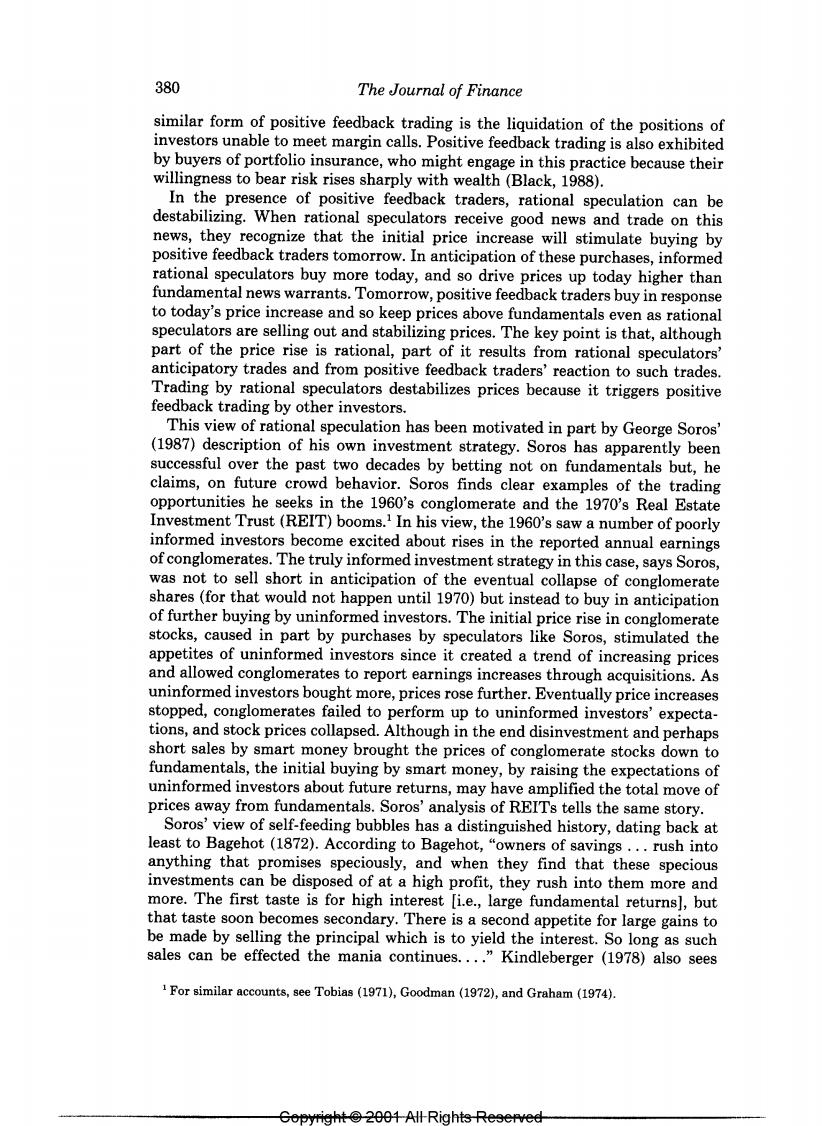正在加载图片...

380 The Journal of Finance similar form of positive feedback trading is the liquidation of the positions of investors unable to meet margin calls.Positive feedback trading is also exhibited by buyers of portfolio insurance,who might engage in this practice because their willingness to bear risk rises sharply with wealth(Black,1988). In the presence of positive feedback traders,rational speculation can be destabilizing.When rational speculators receive good news and trade on this news,they recognize that the initial price increase will stimulate buying by positive feedback traders tomorrow.In anticipation of these purchases,informed rational speculators buy more today,and so drive prices up today higher than fundamental news warrants.Tomorrow,positive feedback traders buy in response to today's price increase and so keep prices above fundamentals even as rational speculators are selling out and stabilizing prices.The key point is that,although part of the price rise is rational,part of it results from rational speculators anticipatory trades and from positive feedback traders'reaction to such trades. Trading by rational speculators destabilizes prices because it triggers positive feedback trading by other investors. This view of rational speculation has been motivated in part by George Soros' (1987)description of his own investment strategy.Soros has apparently been successful over the past two decades by betting not on fundamentals but,he claims,on future crowd behavior.Soros finds clear examples of the trading opportunities he seeks in the 1960's conglomerate and the 1970's Real Estate Investment Trust(REIT)booms.1 In his view,the 1960's saw a number of poorly informed investors become excited about rises in the reported annual earnings of conglomerates.The truly informed investment strategy in this case,says Soros, was not to sell short in anticipation of the eventual collapse of conglomerate shares(for that would not happen until 1970)but instead to buy in anticipation of further buying by uninformed investors.The initial price rise in conglomerate stocks,caused in part by purchases by speculators like Soros,stimulated the appetites of uninformed investors since it created a trend of increasing prices and allowed conglomerates to report earnings increases through acquisitions.As uninformed investors bought more,prices rose further.Eventually price increases stopped,conglomerates failed to perform up to uninformed investors'expecta- tions,and stock prices collapsed.Although in the end disinvestment and perhaps short sales by smart money brought the prices of conglomerate stocks down to fundamentals,the initial buying by smart money,by raising the expectations of uninformed investors about future returns,may have amplified the total move of prices away from fundamentals.Soros'analysis of REITs tells the same story. Soros'view of self-feeding bubbles has a distinguished history,dating back at least to Bagehot (1872).According to Bagehot,"owners of savings...rush into anything that promises speciously,and when they find that these specious investments can be disposed of at a high profit,they rush into them more and more.The first taste is for high interest [i.e.,large fundamental returns],but that taste soon becomes secondary.There is a second appetite for large gains to be made by selling the principal which is to yield the interest.So long as such sales can be effected the mania continues...."Kindleberger (1978)also sees For similar accounts,see Tobias(1971),Goodman (1972),and Graham(1974). Copyright 2001 All-Rights Reserved